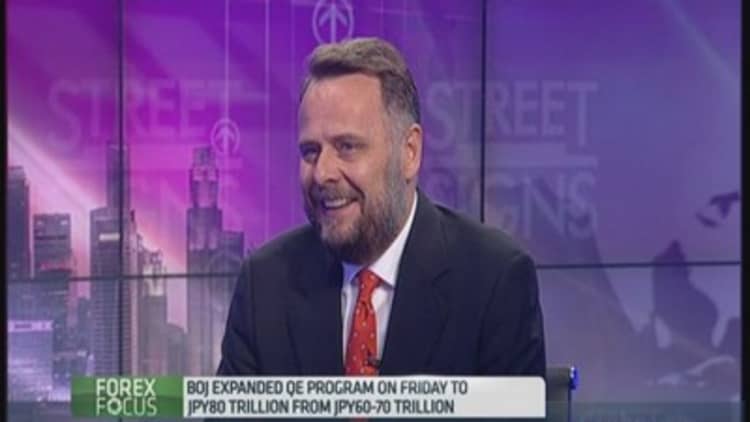A stronger will ultimately hinder the U.S. stock market's performance as domestic exporters receive less cash for their products abroad, according to Capital Economics.
The U.S. dollar hit multi-year highs against several currencies this week, including a seven-year high against the Japanese yen, after Republicans gained control over both chambers of Congress for the first time since 2006, raising hopes of more pro-business policies.
At the same time, U.S. stocks have been powering higher. The S&P 500 and Dow Jones hit record highs on Thursday, and are up 9.48 percent and 5.48 percent year to date, respectively.
Read MoreDollar-yen breaks above 115, what next?
"Although the U.S. stock market has rebounded in recent weeks, its upside could by limited if, as we forecast, the rally in the dollar continues," Capital Economics analysts said.
A stronger greenback means U.S. exporters will be faced with a conundrum: cut profit margins by keeping the foreign currency price of its exports unchanged or risk losing market share by hiking prices abroad. Either way, the dollar's rise will prove a hindrance, Capital Economics said.
Companies selling goods at home, that compete with imports from foreign countries, will also lose out, Capital Economics said. Foreign companies can cut the dollar price of their exports without hurting the value of profits in their home currency, putting them at an advantage and increasing their market share.
"Finally, fluctuations in the dollar's value also affect the earnings of U.S. companies' foreign affiliates, which are very sizeable… As the dollar rises, those overseas earnings are worth less in U.S. currency," the analysts added.

Threat overplayed?
Other analysts told CNBC they do not see a stronger greenback as much of a threat to U.S. equity performance.
"A strong dollar is just one of the factors affecting the U.S. stock market, but it's not the most important or immediate one," said Uwe Parpart, managing director, head of research at Reorient Financial Markets.
"Yes, it's true that a stronger dollar means that the things that U.S. companies make abroad will prove to be less profitable in dollar terms… but the impact is not huge," he added.
Read MoreWall Street is already thinking about QE4
A stronger U.S. dollar is positive for the U.S. economy and, historically, has always been the case, he said: "If you have a strong dollar situation that people expect to persist then that's a good incentive for foreigners to buy U.S. stocks."
Shane Oliver, head of investment strategy and chief economist at AMP Capital, agreed.
"Given that [a strong dollar] reflects a stronger U.S. economy in the first place, as in stronger revenue growth of U.S. companies, stronger gross domestic product and a desire for investors to park their money there for that reason, it's a sign of strength in the U.S. rather than something that dramatically constrains markets," said Oliver.
He expects Wall Street to rally a further 10 percent over the next 12 months: "You will see occasional setbacks where the market will worry about a stronger U.S. dollar, but as long as the U.S. economy remains robust and the Fed continues to act in a relatively benign fashion then the trend will remain up."


